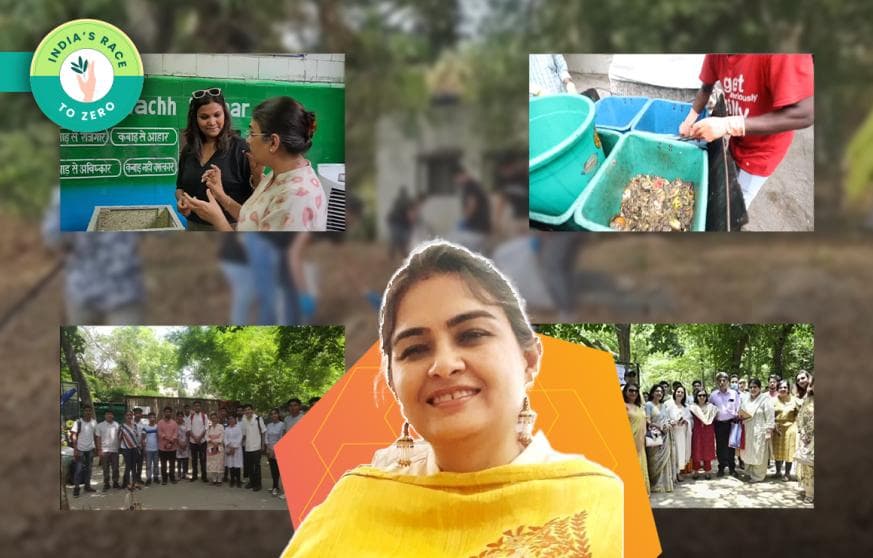Bridging the Gap Between Health and Sustainability
Uniting Communities for Sustainable Change from Awareness to Action with ‘Why Waste Wednesdays Foundation’.
Dr. Ruby Makhija

Sustainability is imperative in our modern world, addressing the critical need to balance environmental health, social well-being, and economic stability. As we face unprecedented environmental challenges, from climate change to resource depletion, the importance of adopting sustainable practices becomes increasingly evident. This holistic approach encompasses a wide range of practices aimed at preserving natural resources, reducing waste, and fostering community resilience. Embracing sustainability requires a collective effort, integrating it into our daily lives, industries, and policies to create a more equitable and thriving world.
My journey into environmental advocacy began with a natural alignment of my passions and values. Being a doctor by profession, I have had a critical awareness of the interconnectedness between the environment and health. In my professional experience, I’ve directly observed how hygiene and sanitation impact the spread of infectious diseases. Being primarily focused on the curative aspect of healthcare, I began to recognise the importance of addressing underlying environmental factors to prevent illness.
Furthermore, I’ve noted a troubling rise in non-communicable diseases like cancer, respiratory ailments, and skin disorders over the years. This surge prompted me to delve into the wider environmental factors contributing to these health challenges. It became clear that addressing ecological sustainability is crucial for protecting public health.
Fortunately, I became engaged with a Resident Welfare Association that echoed my apprehensions regarding the environment-health connection. This involvement offered me a platform to expand my initiatives beyond individual patient care and contribute to broader preventive measures.
Genesis of ‘Why Waste Wednesdays Foundation’
The journey of organising the Why Waste Wednesdays Foundation has been intriguing. Despite my seven-year tenure in this sector, primarily dedicated to fostering behavioural change towards environmental practices and advocating for the adoption of best practices, the NGO itself is relatively young, just over two and a half years old.
Our primary focus revolves around grassroots-level engagement with communities, with a strong emphasis on behaviour change. We conduct thorough analyses of existing practices, identify gaps hindering the adoption of sustainable practices, and devise strategies accordingly. Our goal is to bridge these gaps and facilitate the transition to more sustainable practices.
What makes Why Waste Wednesdays Foundation stand out is our unique approach to environmental awareness. Unlike merely disseminating information, we prioritise sensitising individuals to environmental issues, bridging the gap between knowledge and action. Our emphasis lies in translating awareness into tangible practices on the ground, setting us apart from other organisations. While our projects primarily centre around waste management and single-use plastic control, we acknowledge the interconnectedness of various societal aspects. Thus, alongside these efforts, we place a strong emphasis on community building, fostering engagement among citizens, youth, and stakeholders alike. We firmly believe that collaboration is key to project success. Additionally, we address crucial areas such as women’s empowerment, safety, livelihood generation, and overall quality of life enhancement.
In essence, the Why Waste Wednesdays foundation embodies the fundamental philosophy of prioritising “People, Planet, and Peace”. Our mission is to sensitise individuals, empower communities, and cultivate sustainable practices for the betterment of both society and the environment.
Partnerships
Our collaborative approach extends to partnerships with government agencies, recognising their crucial role in sustainability. With their extensive reach and infrastructure, governments play a pivotal role in driving sustainable practices. An example of this is our Project Vikalp, “Borrow a Bag” initiative, done in conjunction with the Municipal Corporation of Delhi. At the outset, we strategically selected a handful of stores located across Delhi, including local vendors like grocery and fruit shops. This initiative allows individuals to easily borrow a bag for a nominal fee of 20 rupees, refundable upon return, and equipped with a QR code for effortless tracking, promoting sustainable practices seamlessly within daily routines.
Our partnership with the Municipal Corporation of Delhi (MCD) initially started small but expanded significantly due to MCD’s presence across 12 zones. Presently, we have 800 participating stores in Delhi alone, offering individuals convenient access to borrow and return bags. This project exemplifies the power of collaboration. Additionally, engaging with government agencies provides a platform to provide feedback, understanding both their challenges and those faced by grassroots citizens. Moreover, serving as a City Level Task Force Member for plastic waste management in the Municipal Corporation of Delhi presents an opportunity to contribute suggestions and inputs for policy drafting and implementation.
With India’s youth population accounting for 66% of its total, numbering 808 million under the age of 35, their role in fostering environmental awareness and activism is pivotal. This demographic brings abundant energy, innovative ideas, creativity, and technological proficiency to the table. Following up on those lines, We have formal collaborations with colleges and schools involving youth in various initiatives, such as in Navjeevan Vihar, where young children are integral to our “zero waste model.” Assigned to educate four households each, they share knowledge about waste management, segregation practices, and their significance.
Through a partnership with the Municipal Corporation of Delhi and Earth Day Network India, we introduced the Students vs Plastics Toolkit. This comprehensive resource is tailored to educate students about the pressing issue of single-use plastic and recommend lifestyle changes to combat it. Implemented in 2,600 educational institutions across Delhi, the toolkit’s activities encompass three main categories: Firstly, students engage with five households multiple times to convey the toolkit’s message effectively. Secondly, schools orchestrate a minimum of five activities, including debates, rallies, poster-making, poems, and panel discussions, to raise awareness about plastic pollution.
Lastly, students actively participate in plastic collection drives to contribute to waste reduction efforts in their communities. I have personally experienced exceptional results while engaging with young people in this initiative. Moreover, their energy and innovative approaches keep the initiative dynamic and effective.
Navjeevan Vihar: Zero Waste Model Colony
As the Secretary of Navjeevan Vihar, a small colony comprising approximately 270-275 households and housing around 1100-1200 residents, I’ve been involved in spearheading our waste management initiatives. Although I don’t lay claim to it, the community is often recognised as Delhi’s pioneering zero-waste model colony.
Nearly six years ago, we began our collaboration with the municipal corporation, focusing on waste management. For the past five and a half years, we have consistently maintained our zero-waste model, which includes thorough waste segregation at the source. Every household in our community diligently sorts waste into categories like wet, dry, and sanitary. In addition, we carefully separate plastic, electronic, and paper waste, ensuring they are disposed of responsibly.
Thirdly, all our wet waste is composted within the colony. Kitchen waste undergoes composting on-site, saving over six lakh kilograms of waste from reaching the landfill site in the last five and a half years. Annually, we produce 10,000 kilograms of pure organic compost, referred to as black gold, within the colony. Leaf composters are stationed inside the colony to manage green waste effectively, ensuring none of it leaves the premises. Additionally, we utilise shredders to process branches and small twigs for composting purposes. Electronic waste, plastic waste, and paper waste are collected on a weekly or fortnightly basis and sent to recyclers. Moreover, we facilitate sustainable waste management practices in collaboration with the Municipal Corporation of Delhi, which owns the ‘RRR’ (Reduce, Reuse, Recycle) centre.
The Resident Welfare Associations (RWAs), Why Waste Wednesdays initiative, NSS CVS (National Service Scheme, College of Vocational Studies), along with several recyclers and a women’s club from South Delhi, are all integral partners in our RRR campaign. Our collaborative efforts extend to collecting various items such as old clothes, shoes, utensils, furniture, books, and stationery – anything that is in reusable condition. This collection isn’t limited to just our colony; we extend our reach to a radius of 10 kilometres around Navjeevan Vihar. Our centre operates 24/7, allowing donors to contribute at any time of the day or night. Once collected, we sort these items and distribute them to various NGOs catering to the less privileged and senior citizens in need.
So far, we’ve diverted approximately 22,000 kilograms of this material to various destinations. Additionally, we operate a Bartan Bhandar, equipped with 150 sets of steel utensils, including thalis, glasses, spoons, and cutlery, available for borrowing during parties or small gatherings at no cost beyond a small security deposit and a reference undertaking. Through this initiative alone, over the last five and a half years, we’ve prevented the use of more than 40,000 disposables.
At our core, we prioritise community building and resourcefulness, striving to minimise waste in all forms. From organic waste, we produce nutrient-rich compost to nurture our herbal and medicinal gardens, where residents can harvest fresh basil or mint. This collective spirit extends beyond individual dwellings, as we embrace the entire colony as our shared home. Inspired by my rural upbringing, I’ve brought a slice of village life to Delhi, creating a tranquil haven amidst the city’s bustling chaos—a true sanctuary in the heart of Delhi.
Sustainability is not merely a buzzword but a vital framework for ensuring our planet's and its inhabitants' long-term health and prosperity. By adopting sustainable practices, we can mitigate environmental degradation, promote social equity, and responsibly drive economic growth. The journey towards sustainability involves a collaborative effort across all sectors of society, requiring innovative solutions, community engagement, and a commitment to change. As we move forward, it is crucial to remember that sustainability is a shared responsibility. Each action we take, no matter how small, contributes to a larger impact, fostering a future where both people and the planet can flourish in harmony.
